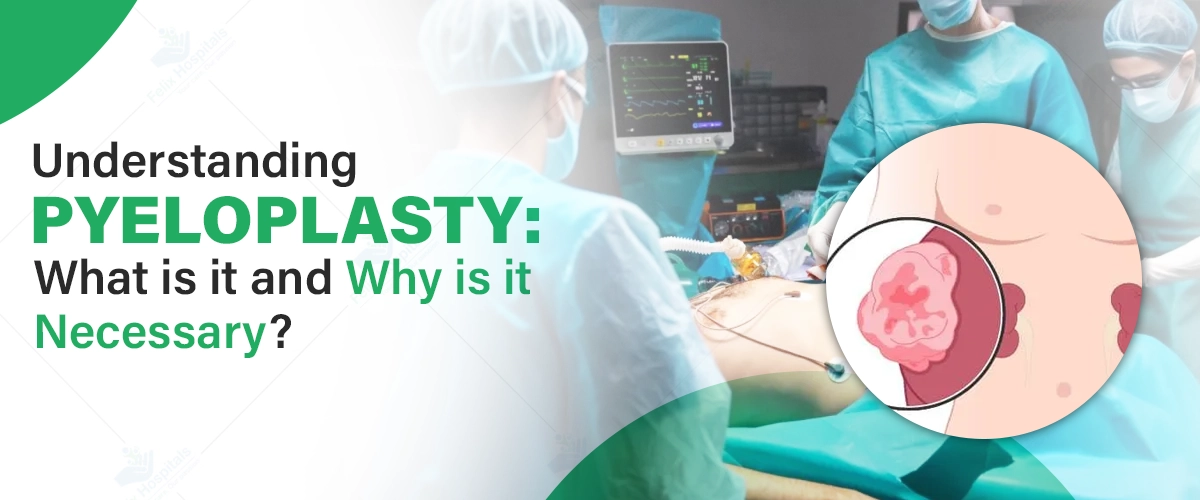
Subscribe to our

Pyeloplasty is a surgical procedure performed to correct a blockage in the ureteropelvic junction (UPJ), ensuring proper urine flow from the kidney to the bladder. This procedure is crucial for maintaining kidney health and overall urinary function. In some cases, pyeloplasty surgery in children is required to correct congenital abnormalities that hinder urine drainage.
People experiencing severe kidney-related issues due to UPJ obstruction may need pyeloplasty to prevent further complications. Early diagnosis and timely intervention can significantly improve kidney function and overall well-being.
Don't let UPJ obstruction compromise your well-being. Book a consultation today and take the first step toward relief! Call us now at +91 9667064100.
Pyeloplasty is a surgical procedure aimed at reconstructing the ureteropelvic junction (UPJ) to restore normal urine flow. This treatment effectively relieves obstruction, preventing kidney damage and infections. Pyeloplasty surgery types vary based on the approach used, ranging from open to minimally invasive techniques.
Common conditions treated with pyeloplasty include:
UPJ obstruction occurs due to various factors, including congenital and acquired causes. Identifying the underlying cause helps determine the most effective treatment approach.
Some individuals are born with a narrowed or blocked UPJ due to improper fetal development. This congenital condition is one of the most common causes of UPJ obstruction and is often diagnosed in infants or young children.
Large kidney stones can obstruct urine flow at the UPJ, leading to pain and swelling in the kidney. When stones fail to pass naturally, they may necessitate surgical intervention, including pyeloplasty.
Previous kidney infections, surgeries, or inflammatory conditions can result in scar tissue buildup at the UPJ. This scarring may restrict urine flow, requiring surgical correction.
Blunt trauma to the kidney or specific medical conditions affecting urinary tract development can impair normal urine drainage, leading to UPJ obstruction.
Patients with UPJ obstruction may experience a range of symptoms that indicate the need for pyeloplasty surgery. These symptoms can vary in severity depending on the degree of obstruction.
Early recognition of these symptoms allows for timely medical intervention, reducing the risk of long-term complications.
To confirm the need for pyeloplasty surgery, doctors perform several diagnostic tests to assess kidney function and detect any structural abnormalities.
Early diagnosis is essential for preventing severe kidney damage and ensuring effective treatment.
Pyeloplasty surgery types include open pyeloplasty, laparoscopic pyeloplasty, and robotic-assisted pyeloplasty. The choice of technique depends on the patient’s condition and the surgeon’s expertise.
Post-operative care is crucial for a successful recovery. Patients should follow these guidelines:
Although pyeloplasty surgery is generally safe, potential risks include:
Pyeloplasty provides multiple advantages, including:
If you are searching for a pyeloplasty surgery doctor in Noida, Felix Hospital provides expert care under the supervision of Dr. Bhanwar Lal Barkesiya, a highly experienced urologist specializing in pyeloplasty procedures. His expertise ensures the best treatment outcomes for patients suffering from UPJ obstruction and related conditions.
Timely intervention is key in preventing severe kidney damage due to UPJ obstruction. Consulting a specialized urologist can help determine the most effective treatment plan. If you are concerned about pyeloplasty surgery costs, Felix Hospital offers comprehensive and affordable treatment options. With advancements in surgical techniques, patients can expect better outcomes and faster recovery, ensuring long-term kidney health.
Q- How do I know if I need pyeloplasty?
Ans- If you have recurring flank pain, urinary infections, or kidney swelling (hydronephrosis), a urologist may recommend pyeloplasty after diagnostic tests like ultrasound or CT scan.
Q- What is the success rate of pyeloplasty surgery?
Ans- Pyeloplasty has a success rate of over 95%, effectively relieving UPJ obstruction and preventing further kidney damage in most patients.
Q- Is pyeloplasty a painful procedure?
Ans- The procedure is performed under general anesthesia, so you won’t feel pain during surgery. Post-surgery, mild discomfort is managed with prescribed painkillers.
Q- How long does it take to recover from pyeloplasty?
Ans- Most patients recover within 3-4 weeks, but full healing may take up to 6 weeks. Minimally invasive techniques like robotic-assisted pyeloplasty ensure faster recovery.
Q- Will I need a stent after pyeloplasty surgery?
Ans- Yes, a temporary stent is placed in the ureter to ensure proper drainage and prevent swelling. It is usually removed within 4-6 weeks post-surgery.
Q- Can UPJ obstruction recur after pyeloplasty?
Ans- Recurrence is rare but possible if scar tissue forms again. Regular follow-ups with your urologist can help detect any complications early.
Q- Does insurance cover pyeloplasty surgery?
Ans- Many health insurance plans cover pyeloplasty, but coverage varies. Contact Felix Hospital’s billing team to check your eligibility and available payment options.